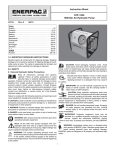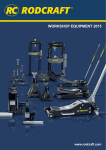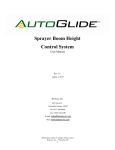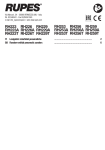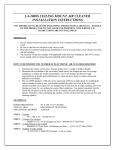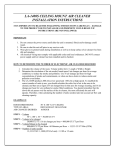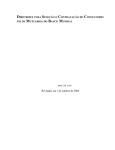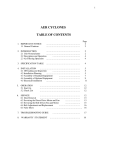Download Arrow Pneumatics RH203 Troubleshooting guide
Transcript
HEATLESS DESICCANT AIR DRYER INSTRUCTION & MAINTENANCE MANUAL MODEL RH203 THROUGH RH224 1 HEATLESS DRYER SERIES INSTRUCTION AND MAINTENANCE MANUAL IMPORTANT BEFORE INSTALLING OR OPERATING THE DRYER IT IS RECOMMENDED THAT THIS MANUAL BE STUDIED AND CLEARLY UNDERSTOOD. SECTION 1. TOPIC DESCRIPTION SAFETY PRECAUTIONS 2. INSTALLATION 3. OPERATION 4. MAINTENANCE & SYSTEM CHECK 5. PREVENTIVE MAINTENANCE 6. TROUBLESHOOTING GUIDE 7. PARTS LIST 8. PURGE CHART 9. ELECTRICAL SCHEMATIC 2 1. SAFETY PRECAUTIONS Warnings, Cautions, and Notes used in this manual have the following significance: WARNING MAINTENANCE OR OPERATING PROCEDURES AND TECHNIQUES THAT WILL RESULT IN PERSONAL INJURY OR LOSS OF LIFE IF NOT CAREFULLY FOLLOWED. CAUTION MAINTENANCE OR OPERATING PROCEDURES AND TECHNIQUES THAT WILL RESULT IN DAMAGE TO EQUIPMENT IF NOT CAREFULLY FOLLOWED. NOTE MAINTENANCE OR OPERATING PROCEDURES AND TECHNIQUES THAT ARE CONSIDERED IMPORTANT ENOUGH TO EMPHASIZE. 3 2. INSTALLATION Arrow Regenerative Air Dryers are shipped as completely assembly packages, filled with desiccant ready to install. Visually check the dryer to make certain that all air lines and electrical connections are securely fastened and were not damaged in transit. If there is evidence of damage, immediately enter a claim with the carrier, and notify your Arrow representative. A. APPLICATION CHECK AND ANALYSIS To achieve the best dryer performance, you should carefully check that the design and installation requirements outlined below are satisfied. 1. Operating pressure of your Arrow Dryer can range from 75 min to 150 max PSIG. Check dryer label and ASME nameplate to verify maximum service pressure. Air available for your air usage will vary with operating pressure. 2. The dryer should not be installed where compressed air and/or ambient temperature exceeds 120°F or drops below +32°F. Locate dryer to avoid extremes of heat and cold from other conditions. Best results occur when dryer is located as close to point of use as practical. Where applicable, dryer towers should be insulated to reduce heat loss. Avoid locating dryer outside or where it is exposed to the elements. 3. Dryers are sized according to airflow not pipe size. Dryer requires 10% to 15% of inlet air (SCFM) for regeneration. The difference between the inlet and outlet flow is the amount of purge air required. This air is purged to atmosphere and is not available for use downstream. Make certain air supply to dryer meets your air demand plus purge air requirements. NOTE DRYERS MUST BE SIZED FOR USABLE AIR REQUIRED PLUS PURGE AIR WHICH EQUALS REQUIRED INLET AIR FLOW TO DRYER. B. MOUNTING SPECIFICATIONS AND DRYER LOCATION 1. Electrical connection must be hard piped with an external fused disconnect switch with proper overload protection. 2. Frame must be suitably ground. WARNING ARROW DRYERS ARE WIRED FOR HIGH VOLTAGE. ONLY QUALIFIED ELECTRICIANS ARE AUTHORIZED TO SERVICE THIS ELECTRICAL EQUIPMENT. 4 3. Generally, locate your dryer downstream from the air receiver. The only exception would be on applications with a fluctuating demand. Then the dryer should be located upstream of the receiver to avoid air surges through the dryer’s desiccant beds. 4. Provide adequate space around the dryer for servicing. Bolt dryer skid to foundation, where possible. C. SUGGESTED PIPING ARRANGEMENT Wet air inlet is at the dryer’s bottom piping assembly. Dry outlet air is from the dryer’s top piping assembly (see attached flow diagram). In situations where air supply is required 24 hours a day (it is undesirable to interrupt the airflow), a three valve bypass system is recommended to bypass the dryer. Use the fewest elbows and taper connections necessary to keep pressure drop at a minimum. D. PREFILTERS / AFTERFILTERS It is important that a prefilter and an afterfilter be provided in your dryer installation. Prefilters, located before dryer, protect desiccant beds from contamination by oil, entrained water, pipe scale, etc., thereby extending dryer desiccant life. Locate prefilters as close to dryer as possible. It is recommended that a mechanical separator be installed immediately preceding the prefilter to remove the bulk liquid oil and entrained water. CAUTION LIQUID WATER SHOULD BE REMOVED BEFORE THE AIR ENTERS THE DRYER. BE SURE SEPARATORS, PREFILTERS AND DRAINS ARE IN GOOD WORKING ORDER. After filters, located after the dryer, help eliminate the possibility of desiccant dusting and carryover into the air system. 5 3. OPERATION A. START-UP After all piping and electrical connections are made, proceed as follows: 1. SLOWLY pressurize the dryer. When the dryer reaches full operating pressure, check the system for air leaks. Soap test all joints and fittings. To maintain desired dewpoint, any leaks detected must be fixed, especially those on the outlet side of the dryer. 2. Adjust purge adjustment valve so that purge pressure gauge reads appropriate pressure (see attached purge pressure chart). 3. Energize electrical circuit. 4. When electrical circuit has been energized, the control circuit board or mechanical timerwill start to operate and automatically initiate dryer operation. The timer is factory set, so that no field adjustment is necessary. NOTE AT INITIAL START-UP, CHECK THE DRYER OPERATION FOR ONE OR TWO CYCLES, ESPECIALLY AT THE TIME OF THE TOWER SHIFT. VERIFY THAT ALL SYSTEMS ARE OPERATING IN THEIR PROPER ORDER AND SEQUENCE. IF THE DRYER IS NOT FUNCTIONING PROPERLY, CONTACT YOU ARROW REPRESENTATIVE. B. DRYER OPERATION The dryer is fully automatic in operation and will now operate with a minimum of maintenance and care. Each sequence of operations is programmed by a central circuit board or mechanical timer. Dryer programs may differ slightly, but all perform similar functions. Standard dryers operate on a 10 minute NEMA cycle with 5 minutes drying and 5 minutes regenerating. At tower switchover, a 20 second time interval is allowed to bring both towers to full line pressure before switchover, thus preventing rapid pressurization which would agitate the desiccant bed. A special repressurization circuit is energized when the purge valve closes to maintain a 30 second repressurization. 6 Repressurization takes place in a downward direction through the bed, minimizing desiccant dusting. C. TIMER OPERATION The dryer’s control circuit board or mechanical timer controls the complete cycle. No field adjustment of any kind is required for proper operation. D. ADJUSTABLE PURGE FLOW SYSTEM RH-Series Exhaust Purge Dryers feature an adjustable purge flow system. The purge flow system consists of: 1. Purge Flow Adjustment Valve 2. Purge Flow Meter (Gauge) 3. Purge Orifice (Located in pipe union) The purge flow system is located between the twin towers of the dryer and/or above the control box. The function of the purge flow system is to regulate the amount of purge air allowed to flow into and subsequently regenerate the off-line (0 PSIG) tower. The purge air flow is controlled by adjusting the purge flow valve to a specific setting as indicated on the purge flow meter (gauge). Once set, the purge flow adjusting valve in conjunction with the purge orifice plate will allow a certain fixed purge air flow. 7 CAUTION TO MAINTAIN THE PROPER OUTLET DEWPOINT, THE DRYER MUST RECEIVE THE PROPER AMOUNT OF PURGE AIR. IF THERE IS EXCESSIVE BACK PRESSURE IN THE TOWER BEING REGENERATED, CHECK THE PURGE MUFFLER AND PURGE PIPING. BACK PRESSURE IS INDICATED WHEN OFF-LINE TOWER PRESSURE GAUGE READS HIGHER THAT 5 PSIG. THE PIPING AND PURGE MUFFLER MUST BE KEPT CLEAN TO MAINTAIN THE PROPER PURGE RATE. WARNING WHEN SERVICING PURGE MUFFLER AND PURGE SYSTEM, DEPRESSURIZE BEFORE DISASSEMBLY. BACK PRESSURE CAUSED BY DIRTY MUFFLER/PURGE SYSTEM CAN CAUSE INJURY SHOULD YOU ATTEMPT TO DISASSEMBLY WHILE PRESSURIZED. E. PURGE FLOW CALCULATION To calculate Purge Air Flow required for your application, you must first complete the formula refer to Purge Flow Calculation Chart below. For gauge pressure (PSIG) we provide idea Purge Flow Calculation Chart that converts the Purge Flow Meter reading from PSIG to SCFM. This chart allows you to calculate changes in purge settings as operating pressure varies. PURGE FLOW FORMULA Inlet System Requirement Absolute Pressure (PSIA) = = Regenerative Constant = SCFM Gauge Pressure (PSIG) + Atmospheric Pressure (14.7 PSI) 16.2 (allowing safety factor) SCFM X 16.2 Abs. Pres. = Purge Air Flow (SCFM) 8 E. MOISTURE INDICATOR OPERATION Moisture Indicator is provided to warn operating personnel of dryer malfunction. If dryer is functioning properly, desiccant in Moisture Indicator will be blue. Should blue color fade or turn pink, discontinue dryer use and consult Troubleshooting Guide. F. OPTIONAL EQUIPMENT (IF APPLICABLE) 1. Dewpoint Demand System (DDS) A. The function of DDS is to conserve energy by eliminating unnecessary dryer cycling and heater power consumption. B. The DDS works by utilizing a moisture sensitive probe to measure the water vapor content of the outlet air from the drying instantaneously to a change in the moisture content of air stream. The moisture content of the sample air stream indicates the wetness of the drying tower’s desiccant bed. The purpose of the probe and its associated electronics is to first measure the “wetness” of the air within the desiccant beds and then regenerate the desiccant beds only when the moisture loading reaches a pre-set maximum dewpoint. C. Dewpoint Demand System Startup and Operation 1. 2. 3. 4. Put dryer’s auto/manual selector switch in “manual” position. Close DDS sample valve. Pressurize the dryer Energize the dryer. Allow dryer cycle for 8 to 16 hours. Observe that both towers have completed a full regeneration cycle. 9 5. Allowing the dryer to operate for two complete cycles ensures that the probe will not be exposed to high humidity and damaging liquid water. This is especially important when dryer has been stored or sitting idle for several months. 6. After this period, slowly open the DDS sample valve so that a small flow of air passes across the probe (approximately 2 to 3 SCFH). This valve should be open at all times when dryer is in operation. 7. Now turn the auto/manual selector switch to the “auto” position. The DDS operational light will come on to provide indication that the Dewpoint Demand System has been activated. NOTE IT IS RECOMMENDED THAT THE DRYER BE OPERATED IN THE MANUAL MODE FOR A PERIOD OF 4 TO 6 MONTHS WHILE DESICCANT AGING OCCURS. 2. Failure to Shift Alarm (FTSA) A. The Failure to Shift Alarm monitors tower shifting and energize an alarm light on the front panel of the control box should the regenerative dryer fail to cycle. B. Should dryer fail to cycle because of malfunction of a system component the FTSA light will be energized. Should FTSA alarm light be observed, refer to “Troubleshooting Guide” and reset the alarm. 3. High Humidity Alarm (HHA) A. The High Humidity Alarm monitors the outlet moisture condition and energizes an alarm light on the front panel of the control box should the regenerative dryer fail to provide proper dewpoint performance. B. Should dryer dewpoint elevate because of malfunction of a system component, overflow condition, oil contamination, or desiccant attrition, the HHA light will be energized. Should alarm light be observed, refer to “Troubleshooting Guide”. 10 4. MAINTENANCE AND SYSTEM CHECK B. PREFILTERS AND AFTERFILTERS 1. Prefilters - The cartridges of the prefilters must be changed as often as required to prevent contamination of the regenerative dryer’s desiccant bed. The prefilter MUST BE DRAINED DAILY. To prolong filter cartridge life, it is recom mended that a mechanical air/moisture separator be placed immediately before the prefilter. If an automatic drain trap is used, check its operation every 48 hours. 2. Afterfilters - The purpose of the afterfilter is to remove residual desiccant dust. NOTE SHOULD THE DRYING SYSTEM BE OVERLOADED AND/OR MALFUNCTIONING, CAUSING HIGH PRESSURE DROP, AFTERFILTERS WILL PREMATURELY PLUG. THIS PROBLEM CAN BE AVOIDED BY FREQUENT INSPECTION AND CLEANING OF CARTRIDGES. C. SOLENOID VALVES Periodically clean all solenoid valves. If the solenoid valves fails to operate, check the following: 1. Control Circuit - Check the outlet voltage from circuit board to verify that the solenoid is receiving electric current. 2. Burned out solenoid cell. 3. High/low voltage - Voltage should be plus or minus 10% of nameplate readings. 4. Solenoid valve leaking - Disassemble, clean and repack or replace. D. TIMER The control circuit board or mechanical timer has no maintenance features. Should the sequencing of towers fail, check voltage signals to the appropriate solenoids. 11 G. EXHAUST MUFFLER THE EXHAUST MUFFLER MUST BE PERIODICALLY CHECKED FOR ANY RESTRICTIVE DEBRIS. At high pressures, a clogged muffler could result in high backpressure and could result in mechanical failure or personal injury. EXHAUST MUFFLER CHANGEOUT PROCEDURE WARNING TO AVOID INJURY, DEPRESSURIZE DRYER BEFORE PERFORMING ANY SERVICE. 1. If possible, shut off supply airflow to dryer. 2. Check that one of the dryer towers is off-line at 0 PSIG and that air is purging through the muffler. 3. Turn control power off. 4. Shut purge flow adjustment valve off 5. Allow air to bleed off so that no air flow is evident through muffler. If muffler is clogged, slowly loosen the muffler and allow the air to bleed off. 6. Replace muffler. 7. Return purge flow adjusting valve to original position. 8. Turn control power back on. 12 5. PREVENTATIVE MAINTENANCE A. DAILY 1. Check and record inlet pressure, temperature and flow. Verify that it is within specifications. 2. Check tower pressure gauge readings within operating tolerance. 3. Check tower pressure gauges for proper dryer cycling 4. Check that there is no condense discharged from prefilters. 5. Verify that pressure in purging tower is 5 PSIG or less. 6. Verify that prefilters and afterfilters differential pressure is within operating limits. C. MONTHLY 1. Check your operating conditions: inlet flow, inlet pressure, and inlet temperature. 2. Check prefilters and afterfilters. 3. Check dryer cycle and sequence of operations. (i.e. drying, depressurizing, regenerating, heating, and cooling) 4. Check tower temperature gauges during third and fourth hour of regeneration cycle. D. EVERY 3 MONTHS 1. Replace prefilter and afterfilter elements. 2. Check pilot air filter element and clean. E. SEMI-ANNUALLY 1. Check outlet dewpoint. 2. Blow down relief valves. F. 1. 2. 3. 4. 5. 6. ANNUALLY Check desiccant and replace if necessary. Inspect and clean pilot operated valves and replace packings as required. Inspect and clean pilot operated valves and replace packings as required. Inspect and clean solenoid valves, check valves, purge lines and lubricated plug valves. Test lights and switches, replace as necessary. Test electrical components, replace as necessary. G. EVERY 3 YEARS 1. Replace desiccant if necessary. 13 6. TROUBLESHOOTING GUIDE PROBLEM Elevated Dewpoint Excessive pressure drop in dryer. Failure to shift towers from drying to regenerating service. PROBABLE CAUSE CORRECTIVE ACTION Insufficient purge rate 1. Check purge flow settings. 2. Check purge piping for obstruction. 3. Clean purge piping and muffler. Inlet air/gas pressure below design condition 1. Check pressure source. Flow rate higher than design condition 1. Check flow rate and caused for increased Demand. Inlet temperature above design condition. 1. Check aftercooler, clean and service as necessary Entrained water entering desiccant bed. 1. Check air/moisture separator and prefilter. 2. Replace dryer desiccant if necessary. Desiccant contaminated by oil 1. Install suitable prefilter 2. Replace dryer desiccant. Excessive flow rate. 1. Check flow rate. 2. Locate cause for increased air demand. Inlet pressure below design condition. 1. Check pressure source. Not input power. 1. Check input voltage Defective timer 1. Check input and output voltages. Defective solenoid valve. 1. Check input voltage to solenoid valve. 2. Check outlet air flow from solenoid valve. No pilot air 1. Check pilot air-line for blockage 2. Check to see if pilot air-line filter is clean. Replace element if needed. Defective inlet valves 1. Check for pilot air to operate valve. Refer to steps above if no pilot air is detected. 14 PROBLEM PROBABLE CAUSE CORRECTIVE ACTION Dryer fails to pressurize Faulty purge valve 1. Check purge valve and its solenoid valve. Refer to earlier steps if no pilot air is detected. 2. Check timer sequencing. Dryer depressurizes too rapidly Purge valve does not close; dryer 1. Check purge valve and its solenoid depressurizing through purge valve. Refer to earlier steps if pilot valve. air is detected. 2. Check depressurization timer circuit. Dryer fails to purge Purge valve does not open; Purge valve stuck in closed position. 1. Check timer micro-switch. 2. Check solenoid valve. Repair and replace if necessary. Purge muffler is clogged 1. Refer to Purge Muffler replacement procedure. Excessive back Purge muffler is clogged pressure in regenerating tower (above Outlet check valve stuck open 5PSIG) 15 1. Refer to Purge Muffler replacement procedure. 1. Clean and/or replace. 7. PURGE FLOW CHART MODEL SCFM PURGE FLOW METER SETTING RH203 35 4.9 45 PSIG RH204 50 7.0 45 PSIG RH205 75 10.6 42 PSIG RH206 100 14.12 60 PSIG RH207 125 17.5 39 PSIG RH208 150 21.2 50 PSIG RH209 200 28.25 50 PSIG RH210 250 35.3 45 PSIG RH211 300 42.37 42 PSIG RH212 350 48.1 50 PSIG RH213 400 56.5 45 PSIG RH214 500 70.6 38 PSIG RH215 650 88.7 35 PSIG RH216 750 105.9 44 PSIG RH217 900 127.1 40 PSIG RH218 1100 155.4 40 PSIG RH219 1300 183.6 47 PSIG RH220 1500 211.8 55 PSIG RH221 1800 254 55 PSIG 16 120/1/60 SS 5 FU 6 L1 L2 GRD 1A 5 SS FU IL-R T IL-LT SVLT SVRT SVPL SVPR PB GRD T-PCB 2 T-PCB IL- R T 2 7 SLVT 2 8 SLRT 2 IL-LT 2 9 SVPR 2 10 SVPL 2 IL-FTS 2 7 G 5 1 4 7 10 2 5 8 11 3 6 9 12 8 START/STOP SWITCH FUSE INDICATOR LIGHT- RIGHT TANK INDICATOR TANK - LEFT TANK SOLENOID VALVE - LEFT TANK SOLENOID VALVE - RIGHT TANK SOLENOID VALVE - PURGE LEFT SOENOID VALVE - PURGE RIGHT PUSH BUTTON/RESET GROUND TIMER - PRINTED WIRING BOARD G 13 R 5 11 PB FAILURE TO SWITCH 5 COMMON NO 12 NO PRESSURE SWITCHES REV ECN DATE DESCRIPTION UNLESS OTHERWISE SPECIFIED TOLERANCES ARE: .0 +/- .060" .00 +/- .030" .000 - AS SPECIFIED ANGLES +/- 1 DEG REMOVE ALL BURRS BREAK SHARP EDGES DO NOT SCALE DRAWING FINISH PNEUMATICS, INC. TREATMENT NAME WIRING DIAGRAM, HEATLESS, SOLID STATE TIMER, FAILURE TO SHIFT ALARM MATERIAL DRAWN BY B. CIOTTI CHECKEDB Y SCALE DATE REV. 9-22-98 DATE PART NO. STD & FTS LEFTTOWERPRESSURE PURGE PRESSURE LE LF ET FT TO TW OW ER ER RG I HTTOWERPRESSURE R G IO H R G IT H T TO T W W E R ER O F F O F F ON ON DR D Y R N IYG N IG DR D Y R N IYG N IG ARR5 O0W PK NE U MA A TC I SN I, C. N .O O D 8 (L A 4K 7 EZ 4 )0 38A U -9W R 1C L 0 IO L 0 H N IR ,O O 6S ID 0047 REGENERATIVEAIR DRYER M O D E L S/N VO LT AG E A M P S S C F M DESS C IANTPERT A N K INLETAIT R EMPMAX MN I INLETAR I PSIMAX MN I L A B E L NO 12.600 Arrow UNLESS OTHERWISE SPECIFIED TOLERANCES ARE: .0 +/- .060" .00 +/- .030" .000 - AS SPECIFIED ANGLES + / - 1 D E G REMOVE ALL BURRS BREAK S H A R P EDGES DO NOT SCALE DRAWING FINISH PNEUMATICS, INC. TREATMENT NAME REPLACEMENT PARTS F O R HEATLESS R E G E N S MATERIAL DRAWN BY DATE CHECKED BY DATE SCALE PART NO. REV. HEATLESS ARROW PNEUMATICS, INC. 2111 WEST 21ST STREET BROADVIEW, IL 60155 WWW.ARROWPNEUMATICS.COM RECOMMEND SPARE PARTS LIST RH-203A THRU RH-224A MODEL PART DESCRIPTION RH203, RH204, & RH205 RH206 & RH207 RH208, RH209, & RH210 RH211 & RH212 RH213 & RH214 INLET VALVE 126150 126155 126156 126157 126157 REPAIR KIT (INLET VALVE) 126150-RK 126155-RK 126156-RK 126157-RK 126157-RK PURGE VALVE 126151 126151 126151 126151 126151 (REPAIR KIT) PURGE VALVE 126151/54-RK 126151/54-RK 126151/54-RK 126151/54-RK 126151/54-RK OUTLET CHECK VALVE 25526 25527 126167 126168 126168 PURGE CHECK VALVE 122091 122091 25526 25526 25526 TIMER - CIRCUIT BOARD 126593 126593 126593 126593 126593 TIMER - MECHANICAL 25552 25552 25552 25552 25552 ON/OFF SWITCH 126503 126503 126503 126503 126503 SOLENOID VALVE BLOCK 126183 126183 126183 126183 126183 INDICATOR LIGHT (GREEN) 126504 126504 126504 126504 126504 INDICATOR LIGHT BULBS QTY 10 126353 126353 126353 126353 126353 PURGE MUFFLER 126060 126060 126060 126060 126060 PRESSURE GAUGE 122150 122150 122150 122150 122150 PRESSURE RELIEF VALVE 126026 126026 126026 126026 126026 MOISTRURE INDICATOR ASSEMBLY 126502 126502 126502 126502 126502 PILOT AIR FILTER 9052 9052 9052 9052 9052 (ELEMENT KIT) PILOT AIR FILTER EK9052 EK9052 EK9052 EK9052 EK9052 REPLACEMENT DESSICCANT TOTAL ACTIVATED ALUMINA - 1/8" BEADS) RH203: 42 LBS, RH204: 58 LBS, RH205: 88 LBS RH206: 116 LBS, RH207: 146 LBS RH208: 174 LBS, RH209: 232 LBS, RH210: 290 LBS RH211: 348 LBS, RH212: 406 LBS RH211: 348 LBS, RH212: 406 LBS 34010 34010 34010 34010 34010 34011 34011 34011 34011 34011 122245 122245 122245 122245 122245 126535 126535 126535 126535 126535 126536 126536 126536 126536 126536 ACTIVATED ALUMINA 400 LBS. FIBER DRUM 1/8" BEADS ACTIVATED ALUMINA 50 LBS. FIBER DRUM 1/8" BEADS PRESSURE SWITCH DEWPOINT DEMAND PLUS SENSOR (OPTIONAL) DEWPOINT DEMAND PLUS CONTROLLER (OPTIONAL) RELAY (OPTIONAL) 122290 122290 122290 122290 122290 MANUAL/AUTO/OFF SWITCH (OPTIONAL) 126543 126543 126543 126543 126543 INDICATOR LIGHT - RED (OPTOINAL) 126509 126509 126509 126509 126509 INDICATOR LIGHT - WHITE (OPTOINAL) CIRCUIT BOARD - DEWPOINT DEMAND/HIGH HUMIDITY (OPTIONAL) 126556 126556 126556 126556 126556 122717 122717 122717 122717 122717 HIGH HUMIDITY SENSOR (OPTIONAL) 123079 123079 123079 123079 123079 DEWPOINT DEMAND SENSOR (OPTIONAL) 122158 122158 122158 122158 122158 TRANSFORMER (480V OPTIONAL) 122297 122297 122297 122297 122297 ARROW PNEUMATICS, INC. 2111 WEST 21ST STREET BROADVIEW, IL 60155 WWW.ARROWPNEUMATICS.COM RECOMMEND SPARE PARTS LIST RH-203A THRU RH-224A MODEL RH220, RH221, & RH218 & RH219 RH222 PART DESCRIPTION RH215 & RH216, & RH217 INLET VALVE 126158 126227 126160 126160 REPAIR KIT (INLET VALVE) 126158-RK 126227-RK 126160-RK 126160-RK PURGE VALVE 126154 126154 126154 126154 (REPAIR KIT) PURGE VALVE 126151/54-RK 126151/54-RK 126151/54-RK 126151/54-RK OUTLET CHECK VALVE 126228 126228 126166 126166 PURGE CHECK VALVE 25527 25527 25527 25527 CIRCUIT BOARD TIMER 126593 126593 126593 126593 TIMER - MECHANICAL 25552 25552 25552 25552 ON/OFF SWITCH 126503 126503 126503 126503 RH223, & RH224 SOLENOID VALVE BLOCK 126183 126183 126183 126183 INDICATOR LIGHT (GREEN) 126504 126504 126504 126504 INDICATOR LIGHT BULBS QTY 10 126353 126353 126353 126353 PURGE MUFFLER 126061 126061 126061 126061 PRESSURE GAUGE 122150 122150 122150 122150 PRESSURE RELIEF VALVE 126026 126026 126026 126026 MOISTURE INDICATOR ASSEMBLY 126502 126502 126502 126502 PILOT AIR FILTER 9052 9052 9052 9052 (ELEMENT KIT) PILOT AIR FILTER EK9052 EK9052 EK9052 EK9052 REPLACEMENT DESICCANT TOTAL ACTIVATED ALUMINA - 1/8" BEADS RH215: 754 LBS, RH216: 870 LBS RH217: 1044 LBS ACTIVATED ALUMINA 400 LBS. FIBER DRUM 1/8" BEADS ACTIVATED ALUMINA 50 LBS. FIBER DRUM 1/8" BEADS PRESSURE SWITCH DEWPOINT DEMAND PLUS SENSOR (OPTIONAL) DEWPOINT DEMAND PLUS CONTROLLER (OPTIONAL) RH220: 1740 LBS, RH218: 1276 LBS, RH221: 2088 LBS, RH219: 1508 LBS RH222: 2436 LBS RH223: 2750 LBS, RH224: 3300 LBS 34010 34010 34010 34010 34011 34011 34011 34011 122245 122245 122245 122245 126048 126048 126048 126048 126536 126536 126536 126536 RELAY (OPTIONAL) 122290 122290 122290 122290 MANUAL/AUTO/OFF SWITCH (OPTIONAL) 126543 126543 126543 126543 INDICATOR LIGHT - RED (OPTIONAL) 126509 126509 126509 126509 INDICATOR LIGHT - WHITE (OPTIONAL) CIRCUIT BOARD - DEWPOINT DEMAND/HIGH HUMIDITY (OPTIONAL) 126556 126556 126556 126556 122717 122717 122717 122717 HIGH HUMIDITY SENSOR (OPTIONAL) 123079 123079 123079 123079 DEWPOINT DEMAND SENSOR (OPTIONAL) 122158 122158 122158 122158 TRANSFORMER (480V OPTIONAL) 122297 122297 122297 122297
























